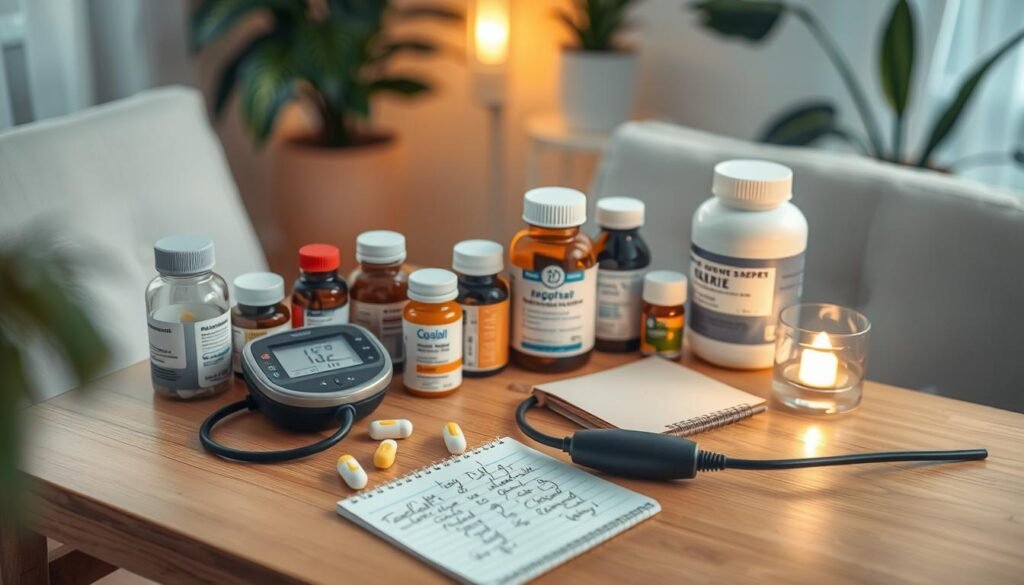Did you know that nearly half of the adults in the U.S. battle hypertension? This condition could lead to serious problems like stroke or heart failure. For many people, carvedilol is a light at the end of the tunnel. It’s a dual-action beta-blocker mainly used for high blood pressure and certain heart problems. Interestingly, it’s also being seen as a way to manage anxiety. In this text, we’ll explore carvedilol’s role in anxiety treatment, especially focusing on the right dosage.
Carvedilol is special because it tackles both heart and anxiety symptoms. This makes it a smart pick for those dealing with anxiety and heart issues together. Knowing how to control anxiety with the right carvedilol dose is key. There are detailed guides to help patients. These cover initial dosages, how to adjust them, and why taking carvedilol consistently matters.
Patients shouldn’t go above the suggested dose or treatment length without a doctor’s advice. Missed a dose? Take it as soon as you remember, but watch out for taking too much. For a better grasp of carvedilol and its role in treating both high blood pressure and anxiety, check out expected carvedilol dosages.
Key Takeaways
- Carvedilol is primarily used to manage high blood pressure and heart failure.
- Proper dosage adherence is vital for effective anxiety management with carvedilol.
- Starting dosages differ based on the condition being treated, with adjustments possible based on response.
- Patients must maintain consistent timing when taking carvedilol for optimal results.
- Consultation with healthcare providers is essential when managing carvedilol dosage anxiety.
Understanding Carvedilol and Its Uses
Carvedilol is a key medicine for treating heart-related issues. It improves life quality for its users. This part talks about carvedilol and what it treats.
What is Carvedilol?
Carvedilol, known as Coreg, is a medicine taken orally. It’s available as tablets and capsules in various strengths. Being a beta blocker, it helps by influencing heart and blood vessel nerve signals. It lowers heart rate and blood pressure, and increases heart blood flow. It’s crucial to take it with food daily for the best result.
Conditions Treated by Carvedilol
Carvedilol mainly treats high blood pressure and heart failure. It’s important for recovery after a heart attack. It helps with:
- High blood pressure (hypertension)
- Heart failure
- Left ventricular dysfunction after a heart attack
- Certain circulation problems
It’s a long-term treatment for adults, starting usually at 3.125 mg to 6.25 mg twice a day. Dosages may go up to 25 mg twice daily, based on health and response. Older adults often need lower doses. Regular check-ups are vital for safety and effectiveness.
The Role of Carvedilol in Anxiety Management
Carvedilol helps control anxiety symptoms as a beta-blocker. People with anxiety often feel their heart race or hands shake. Knowing how carvedilol works assists in choosing the best treatment.
How Carvedilol Works in the Body
Carvedilol blocks adrenaline, lowering heart rate and blood pressure. This reduces the physical signs of anxiety. Studies show it can work fast, in just 1-2 hours, for short-term relief.
Carvedilol for Anxiety Treatment
Doctors may combine carvedilol with therapy or lifestyle changes for anxiety. It’s useful for stage fright and social anxiety. Talk with a doctor to see if carvedilol suits your needs. Weighing its side effects, like tiredness and dizziness, against its benefits is crucial. Carvedilol is a key option for treating anxiety.
| Aspect | Details |
|---|---|
| Mechanism | Blocks adrenaline effects, lowers heart rate and blood pressure |
| Uses | Managing physical anxiety symptoms, like rapid heart rate and tremors |
| Conditions Treated | Performance anxiety, social anxiety disorder |
| Speed of Effect | Noticeable improvement within 1-2 hours |
| Possible Side Effects | Fatigue, dizziness, bradycardia, low blood pressure |
Carvedilol Dosage Anxiety: Managing Your Treatment
Understanding the right carvedilol dosage for anxiety is key. It’s vital to watch closely and make changes as needed. This ensures the medicine works best for you.
Typical Starting Dosages
Starting doses of carvedilol vary by condition. For high blood pressure in adults, the starting dose is 6.25 mg twice daily. For heart failure, it starts at 3.125 mg twice daily. Carvedilol comes in oral tablets and extended-release capsules. This lets doctors customize the treatment.
Dosage Adjustments Based on Response
Making changes to your carvedilol dose is crucial. Adjust based on how you react and what you can handle. Regular check-ins with your doctor make sure you’re at the best dose. Always stick to your daily schedule. Don’t double up if you miss a dose. Keep taking carvedilol even if you feel better. Stopping suddenly can cause problems.
It’s very important to keep an eye on your blood pressure and heart rate. Do this especially when you’re starting out or changing your dose. Being careful helps avoid issues and successfully manage your anxiety.
Off-Label Uses of Carvedilol
Carvedilol is mainly used for heart-related issues. Lately, it’s been looked at for off-label carvedilol use in treating anxiety. This is important for patients and doctors looking into other treatment choices.
Understanding Off-Label Uses
Off-label use means using medications for conditions they weren’t initially approved for. For carvedilol, this shows how flexible it is. Beta-blockers like this are usually for heart problems, but they may also ease anxiety symptoms. This has sparked some interest. There is research showing carvedilol could help with the physical side of anxiety. This is especially true for those also dealing with heart issues. You can find more on beta-blockers and anxiety here.
Carvedilol in Treating Anxiety Disorders
Early studies show carvedilol might help people with carvedilol anxiety disorder. This is particularly true when anxiety causes physical reactions. Beta-blockers, including carvedilol, stop adrenaline’s effects. This can lead to less symptoms like fast heartbeats and sweating. It’s really helpful for stage fright or other stress moments.
Even though carvedilol hasn’t been studied for anxiety as much as others like propranolol, it’s still considered for off-label medication uses in mental health. Always talk about treatment options with your doctor to find what’s best for you. Remember, beta-blockers can have side effects.

| Medication | Primary Use | Off-Label Anxiety Use |
|---|---|---|
| Carvedilol | Heart conditions | Potential for anxiety management |
| Propranolol | Heart conditions | Performance anxiety |
| Atenolol | Heart conditions | Generalized anxiety disorder |
| Metoprolol | Heart conditions | Social anxiety |
Beta Blocker Dosing in Anxiety Treatment
Beta blockers are getting noticed for managing anxiety, focusing on dosing and effectiveness. They especially help with anxiety’s physical signs. The outcome of using beta blockers can vary based on the drug and how it works.
The Effectiveness of Beta Blockers
Medications like carvedilol are used off-label for anxiety. They help with symptoms such as fast heart rate and sweating. This can be very helpful in situations like giving a speech. There’s evidence that the type of beta blocker makes a difference. Carvedilol is good for heart issues and anxiety symptoms. Knowing the pros and cons of dosing is key for those considering these meds.
Comparing Carvedilol with Other Beta Blockers
Carvedilol differs from other beta blockers like propranolol. It’s used for high blood pressure and heart failure. On the other hand, propranolol is chosen for performance anxiety despite not being approved for general anxiety. Let’s look at how they compare:
| Medication | FDA Approved Uses | Common Doses | Off-Label Uses | Side Effects |
|---|---|---|---|---|
| Carvedilol | Heart failure, hypertension | 3.125 mg, 6.25 mg, 12.5 mg, 25 mg | Physical symptoms of anxiety | Dizziness, fatigue, weight gain |
| Propranolol | High blood pressure, migraine headaches | 10 mg, 20 mg, 40 mg, up to 320 mg | Performance anxiety, essential tremor | GI upset, dizziness, shortness of breath |
Choosing the right medication involves looking at the specific dosing and a person’s medical history. Healthcare experts can help figure out the best plan for each individual. For more on using beta blockers, check out this resource.
Carvedilol Side Effects Related to Anxiety
It’s important to understand the side effects of carvedilol, especially for those with anxiety. Carvedilol is often used to treat high blood pressure and heart failure. However, its side effects can sometimes make anxiety worse. Thus, talking with healthcare providers and careful monitoring is key.
Common Side Effects of Carvedilol
Carvedilol users might face several common side effects. These can be:
- Dizziness
- Fatigue
- Low blood pressure
- Diarrhea
- Weight gain
- High blood sugar
- Changes in sex drive
- Dry eyes
- Headaches
- Nausea
Side effects like dizziness and low blood pressure can make anxiety symptoms worse. Managing these side effects well can help improve mental health and make treatment more bearable.
Managing Side Effects
Managing the side effects of carvedilol is crucial. Here are some strategies:
- Keep in touch with your healthcare provider about any side effects. They might adjust your dose if needed.
- Watch your blood pressure and heart rate. Changes might mean your dose needs to be changed.
- Eat a balanced diet and exercise regularly. These steps can help control weight gain and boost health.
- Drink plenty of water and avoid alcohol. This can help lower the risk of dizziness and low blood pressure.
Starting early with side effect management is vital for effective treatment. Patients should feel able to talk about their experiences. This helps ensure the treatment plan meets their health needs.
Benefits of Carvedilol for Anxiety Patients
Carvedilol helps people dealing with anxiety in several ways. It has shown potential in improving symptoms that make daily life hard. As it gets more attention, its role in health is becoming more clear.
Potential Improvements in Anxiety Symptoms
Carvedilol may lower anxiety by calming the body’s stress response. It’s been effective in animals, showing less stress behavior. For example, it helped with movement and reduced anxious actions. This makes it useful for managing stress every day. Find out about the research here.
Long-Term Benefits of Carvedilol
Carvedilol’s benefits go past just handling anxiety. It helps with both anxiety and other health issues like blood pressure and heart disease. Staying on carvedilol can lead to better health and life quality. Over time, users see fewer stress signs and feel more emotionally stable.
| Study Parameter | Observation | Effect of Carvedilol |
|---|---|---|
| Locomotor Activity | Reduction due to stress | Reversed by carvedilol treatment |
| Anxiety-like Behaviors | Increased under stress | Reduced with carvedilol |
| Adrenal Gland Size | Decreased under stress | Restored with carvedilol |
| Immune Response | Altered cytokine levels | Normalized with carvedilol |
Monitoring Your Treatment with Carvedilol
Monitoring your carvedilol treatment is key for staying healthy. It’s important for patients to keep track of their dosage. This helps make sure they stick to their treatment plan and spot any side effects early. Writing down details can also make doctor’s visits more productive. This way, your doctor can easily see how your treatment is going and if any changes are needed.
How to Track Your Dosage
There are several ways to keep an eye on your dosage. Here’s what patients can do:
- Maintain a daily log: Write down when and how much you take each time.
- Monitor symptoms: Keep track of any changes in how you feel, your heart rate, or side effects.
- Use medication management apps: These apps can remind you to take your medicine and record your doses.
- Create a medication calendar: This can help you stay on track and know when your next dose is due.
Communicating with Your Healthcare Provider
Talking regularly with your healthcare provider is vital. Routine check-ups are a chance to talk about how well your treatment is going. You can work together to decide if your dosage needs changing or if there are any concerns to address. Points to talk about include:
- Side effects experienced: Be honest about any negative effects you’re feeling.
- Dosing concerns: Talk about any trouble you’re having with your dosage or if you’ve noticed symptoms that need addressing.
- Health changes: Tell your doctor about new health issues, especially those affecting your heart, blood sugar, or blood pressure.
- Medication interactions: Mention any new drugs or vitamins you’re taking to avoid harmful combinations.

Important Considerations for Taking Carvedilol
Understanding key factors is vital when taking carvedilol. This includes possible drug interactions and the right way to store it. These aspects help patients manage their health better.
Drug Interactions
Carvedilol may react with other medicines, which makes knowing about drug interactions crucial. For example, mixing it with certain heart drugs or calcium channel blockers could change its effect. It might also increase side effects. People must tell their doctors about all the medicines they take. This includes over-the-counter items and supplements. Not doing so can cause serious issues, like very low blood pressure or more chances of slow heart rates. See the table below for major interaction risks with carvedilol:
| Drug Class | Effect of Interaction |
|---|---|
| Beta-Blockers | Increased risk of bradycardia and hypotension |
| Calcium Channel Blockers | Enhanced bradycardic effects |
| Diabetic Medications | Possible hypoglycemia |
| Amiodarone | Increased risk of cardiac arrest |
| Grapefruit Juice | Increased blood concentrations of carvedilol |
Storage and Handling of Carvedilol
The way you store carvedilol matters a lot. It should be kept at room temperature, in a place dry and dark. This ensures it works as expected for a long time. Also, it’s key to keep it away from kids to avoid accidents. Following these storage tips can help protect your health while you use this medication.
Why Following Prescribed Dosage is Crucial
Taking the right amount of carvedilol is key to your treatment working well. It helps ease anxiety symptoms and boosts overall health. Knowing the dangers of taking too much carvedilol points out why it’s important to listen to your doctor.
Potential Risks of Overdosing or Underdosing
Not sticking to the right carvedilol amount can cause problems. Taking too much can drop your blood pressure and heart rate too low. On the other hand, not taking enough might not help your anxiety or could make heart issues worse. Staying on track with your dosage makes sure the medication works right.
Keeping a consistent dosage matters a lot. It keeps carvedilol levels steady, helping with anxiety and heart conditions. Skipping doses or not following instructions can halt your progress. It’s vital to follow the plan your doctor sets to get the best results and keep risks low.

Conclusion
Carvedilol offers a unique way to manage anxiety, especially for those with heart issues. It’s crucial to understand how to use this medication correctly. Working closely with healthcare providers ensures a well-planned treatment.
Knowing the possible side effects of carvedilol is important too. This knowledge helps in handling them better. Carvedilol’s benefits and its close monitoring highlight its value in treating anxiety disorders. For more info on similar topics, check out clonidine for anxiety.
Carvedilol can help reduce the physical signs of anxiety by focusing on the root causes. This makes it a significant choice for patients looking for relief. Ensuring medical guidance is followed throughout treatment is key.